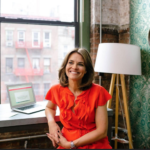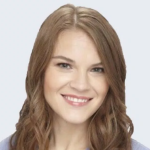Jordana Kier and Alexandra Friedman are the founders of the tampon subscription company, LOLA. Unlike most tampons, LOLA tampons are 100% cotton — which means they’re 100% natural and 100% biodegradable. Before launching LOLA, Jordana worked at Rent the Runway and Quidsi and Alexandra worked at Flurry Analytics (acquired by Yahoo in 2014) and was a consultant at Boston Consulting Group. Jordana and Alex met at Dartmouth College, where Alex was part of an organization that secretly stocked bathrooms with tampons and Jordana needed one.
What inspired you to start LOLA?
We founded LOLA with a simple and seemingly obvious idea – you shouldn’t have to compromise when it comes to tampons. Like most women, we’d been using the same feminine care products since we were teenagers. But when we found out that feminine care brands – the same ones we were loyal to all those years – aren’t required to disclose exactly what’s in their products, it made us wonder: What’s in our tampon? Contrary to popular belief, cotton isn’t the primary ingredient in most tampons. In fact, they’re typically made from a blend of the artificial fibers rayon and polyester. To us, it just didn’t make sense. If we care about everything else we put in our bodies, this shouldn’t be any different.
So we set out to create LOLA, a modern approach to feminine care. Made from 100% cotton certified by Cotton Inc., our products are hypoallergenic and don’t contain any synthetics, chemicals, or dyes. LOLA tampons are wrapped in a BPA-free compact plastic applicator so you don’t have to compromise simple and natural ingredients for comfort. In addition to full ingredient transparency, we provide women the freedom to easily tailor the absorbency assortment and frequency of deliveries to fit their schedules.
What makes LOLA different than other tampon brands?
We’ve always said that one thing setting LOLA apart from other brands is the way we speak to our customers in an honest, real-talk way. Realistically, none of us are frolicking in a white bathing suit during our periods. So we try to infuse a lot of humor along with our more serious themes of knowing what’s in your products and owning the conversation around feminine care. If you check out our Instagram, you can see we have fun and don’t take ourselves too seriously.
We also know that having your period can be a drag, so our brand is all about making it easier and sending what you need, when you need it. LOLA provides the most seamless and convenient experience with the best of both worlds: a 100% cotton tampon in a compact plastic applicator. When we first started out, we were set on creating a service that we would sign up for ourselves, so we built our subscription model with the utmost flexibility to allow you to adjust the assortment, quantity, or delivery anytime.
What advice do you have for other people who want to start their own business?
Develop a network where you have mentors and people you can rely on for honest feedback and advice. We’ve been very lucky to have cultivated a network of people who are very supportive, but who also provide tough love and aren’t just saying “great job” all the time. They’re giving us objective feedback, and that has been invaluable.
You recently raised $1.2 million. What was the process like for you and what advice do you have for other people hoping to raise funding?
It wasn’t easy! Someone once told us that to start a company you have to be a touch insane, and that definitely rings more than a little true. In the early days, when we didn’t have a prototype, it took a lot of perseverance to walk into meeting after meeting ready to pitch our vision with no product to show for it. We could picture the LOLA brand and our service so clearly and knew we just needed some seed capital to bring our dream to life.
Investors – of all genders – were extremely receptive to our vision. At first, we were nervous the predominantly male investor community wouldn’t be able to relate to the value proposition given they are not consumers of our product. However, when we raised the issue that most women had no idea what was in their tampon, that lack of transparency was a topic that deeply resonated across genders. We were bringing not only a new product to market, but also a new way of thinking to market, and we found that this way of thinking appealed to many.
What is a typical day like for you?
A typical day in the life is a little of a lot. As we’re a small team, we both have our hands in many areas of the business on a daily basis. Generally, we’ll start the day with a workout (core strengthening for Alex, spinning for Jordana). We spend a lot of time meeting with folks who could be powerful allies – investors, partners, and influencers – and always enjoy hearing feedback and advice on our business from different perspectives. We usually have lunch together and, in addition to our usual shenanigans, we’ll discuss our spending plans, marketing strategy, and goals. In the afternoon, we have a weekly meeting with our web development team. They’re based in Montreal, so each week we have a video chat to cover the current iteration of edits to the site. When we’re not in meetings, you can find us at our desks catching up with the team, hearing about any interesting customer feedback, and troubleshooting any ops or marketing-related challenges. In the evenings, we both have plans with friends.
What is the best thing about having a co-founder?
The best thing is having someone to share everything with, both the highs and the lows. It’s much easier knowing someone else is going through it with you and that person always has your back. For us, the fact that we come from different professional backgrounds (Alex in consulting and ad tech, Jordana in non-profit and music) has helped tremendously. We fill the gaps in one another’s skillsets – neither of us could do it alone.
You both went to business school at Columbia Business School and Wharton respectively. Did you find that the skills you learned have contributed to LOLA’s success?
Absolutely. Business school was a crash course in being resourceful, working with a lot of different types of people, and being strategic yet detail-oriented. At business school, we both spent a lot of time studying case studies of other businesses, debating the merits of the decisions they made and whether the leaders in place were effective in their roles. This broad exposure, training in high-level strategic thinking, and regular hands-on problem-solving has definitely been integral to our company’s DNA and early successes.
What have you learned about yourself as a result of starting your company?
We have learned to trust our instincts. And we’ve learned how important it is to leverage other smart people. There is no roadmap when you’re making something out of nothing, and we’ve learned that we are both very comfortable in ambiguous situations. Neither of us had ever pushed ourselves so far in this direction before, and we’ve learned that we thrive in an environment where we constantly have to innovate.
What do you think is the biggest issue for women in the workplace?
Not an easy question to answer! But the tension between family and career is something that we are extremely conscious of for both genders. A highly professionally successful friend once told us: “You have to pick three things and focus on them. That’s all you can really manage.” Our values are very aligned and for us, work, family and friends, and staying fit are those three things. We try to find balance, make time for our passions (like travel), and fit in other things we care about, too (such as hobbies and community service) but the so-called “myth of work/life balance” is something we know has to be actively managed. And we see that for new parents– particularly women– it’s commonly one of the greatest struggles of a career.
What is the best piece of advice you’ve ever received?
Nothing is ever as scary as you think it is.
Thank you, Jordana and Alexandra!
































Pingback: My Favorite Career Profile Quotes From 2015 - Elana Lyn